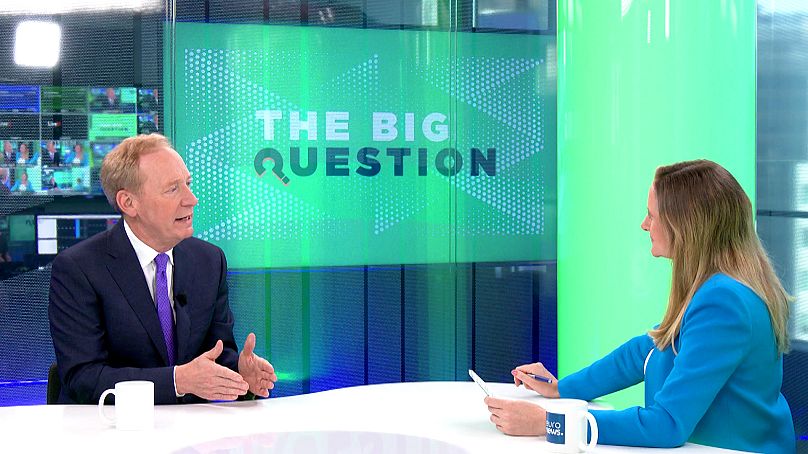On 30 April, Microsoft announced its New European Digital Commitments, in a speech by the company’s president, Brad Smith, in Brussels.
In the commitments, Microsoft pledged to build a broad AI and cloud ecosystem across Europe, uphold Europe’s digital resilience - even when there is geopolitical volatility - and, amongst others, strengthen Europe’s economic competitiveness.
However, in the current context, where much of the geopolitical volatility is coming from the US, is an American tech giant the right choice to be helping Europe?
In this episode of The Big Question, Microsoft’s vice chair and president, Brad Smith, joined Euronews’ business editor, Angela Barnes, to discuss the company’s latest plans.
How can Microsoft help Europe’s struggling competitiveness?
Brad’s vision of Microsoft’s purpose seems to be to “provide technology that will make others, individuals and organisations, more successful.”
As part of the group’s plans to grow AI and cloud ecosystems in Europe, Microsoft has pledged to expand European data centre capacity by 40% over the next two years. This will mean more than 200 data centres in operation in 16 European countries.
And while this development will bring with it the immediate employment opportunities, Brad was equally excited for “the multiplier effect” for their customers and the economic benefits that could ensue.
“It is, I think, an engine of growth for what we like to describe as an AI economy: the economies of the world in an AI era. And I think we're just going to see AI as indispensable to almost everything that we, as businesses, as governments, as non-profits, want to do,” Brad told The Big Question.
Can Microsoft survive without Europe?
Whilst Microsoft’s investments would be a great help as Europe struggles with competitiveness, it also shows the company’s commitment to a continued presence across the bloc, no matter the geopolitical conditions. It's of course a mutually beneficial relationship.
“I don't think Microsoft would be the global success it is today without our longstanding presence in Europe,” Brad said.
“The truth is it's more than a quarter of our global business.”
The 50 year old tech giant, founded in Albuquerque, New Mexico first launched its iconic word processing programme Word in 1983 and witnessed its first foray into the European market, offering the program in French and German. Paris was also where Brad personally started his Microsoft career, back in 1993.

As part of their pledge to uphold Europe’s digital resilience even when there is geopolitical volatility, Microsoft has added a clause to their agreements with European governments and the European Commissions to legally contest any power that tries to force them to suspend operations in Europe.
“I have every confidence that we would prevail in court. But we've also said that if we did not, we'll have a backup group of suppliers, partners here in Europe who'll have our code, our software code and our source code stored in a secure repository in Switzerland.”
He hopes this will allay some people’s fears around EU data security, while insisting that White House Officials have assured him this is not a move they’re considering.
When asked how Microsoft would react in the midst of a potential tariff war between Europe and the USA, Brad responded:
“We will take whatever comes and we'll help our customers adapt and we'll adapt.
“But mostly I want us to be a voice of reason that encourages the ties across the Atlantic that have been indispensable for eight decades now, since the end of the Second World War, to prevail, to use this as an opportunity for all of us in a way to step back and then recommit.
“Let's address the issues that bother people on either side of the Atlantic, but let's not forget how important these ties are, including for business.”
The Big Question is a series from Euronews Business where we sit down with industry leaders and experts to discuss some of the most important topics on today’s agenda.
Watch the video above to see the full discussion with Microsoft President, Brad Smith.







